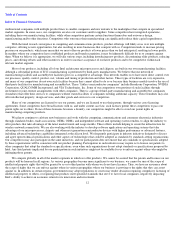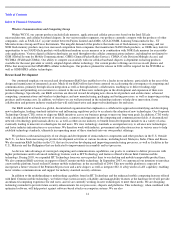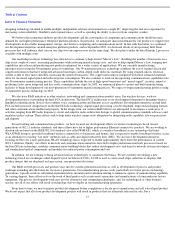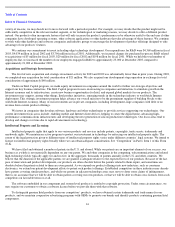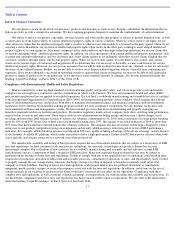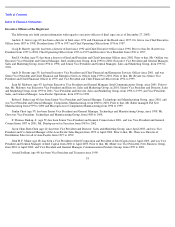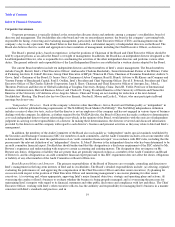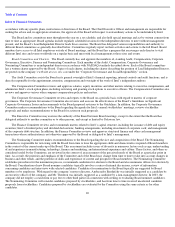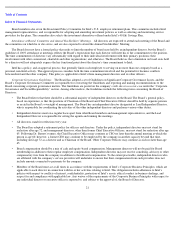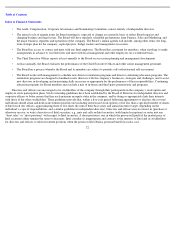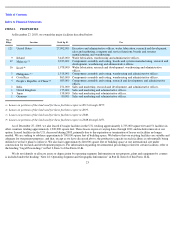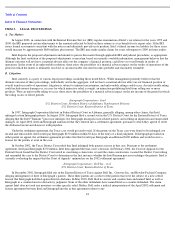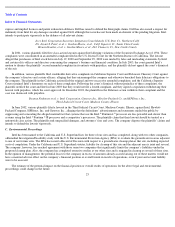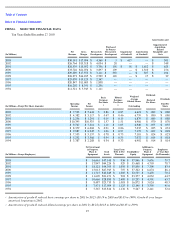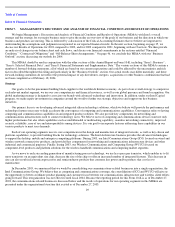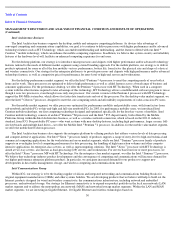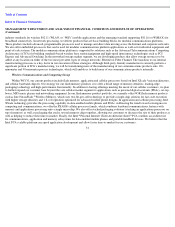Intel 2003 Annual Report Download - page 24
Download and view the complete annual report
Please find page 24 of the 2003 Intel annual report below. You can navigate through the pages in the report by either clicking on the pages listed below, or by using the keyword search tool below to find specific information within the annual report.
Table of Contents
Index to Financial Statements
Board members also sit on the Investment Policy Committee for Intel’s U.S. employee retirement plans. This committee includes Intel
management representatives, and is responsible for adopting and amending investment policies as well as selecting and monitoring service
providers for the plans. The committee also selects the investment alternatives offered under Intel’s 401(k) Savings Plan.
Attendance at Board, Committee and Annual Stockholders’ Meetings.
All directors are expected to attend each meeting of the Board and
the committees on which he or she serves, and are also expected to attend the Annual Stockholders’ Meeting.
The Board does not have a formal policy that seeks to limit the number of board seats held by an independent director, but the Board’s
guideline of 100% attendance at meetings reflects the Board’s expectation that each director will meet his or her commitments to the position.
The time commitments of directors vary substantially with regard to their individual involvement with their primary positions; their
involvement with other commercial, charitable and other organizations; and otherwise. The Board believes that a limitation on board seats held
by a director will not adequately express the key functional point about the director’s time commitment to Intel.
Intel has a policy, and an approval process, that generally limits each employee to serving on no more than one company board as a
personal, non-Intel activity. The approval process considers both the time commitment involved and the potential for business conflicts
between Intel and the other company. This policy is applicable to Intel’s three management directors and its other officers.
Corporate Governance Guidelines. The Board has adopted a set of Guidelines on Significant Corporate Governance Issues, and the
Board’s Corporate Governance Committee is responsible for overseeing the Guidelines and reporting and making recommendations to the
Board concerning corporate governance matters. The Guidelines are posted on the company’s web site at www.intc.com under the “Corporate
Governance and Social Responsibility” section. Among other matters, the Guidelines include the following items concerning the Board of
Directors:
21
• The Board believes that there should be a substantial majority of independent directors on the Board. The Board’s general policy,
based on experience, is that the positions of Chairman of the Board and Chief Executive Officer should be held by separate persons
as an aid in the Board’s oversight of management. The Board has an independent director designated as Lead Independent Director,
who is responsible for coordinating the activities of the other independent directors and performs various other duties.
• Independent directors meet on a regular basis apart from other Board members and management representatives, and the Lead
Independent Director is responsible for setting the agenda and running the meetings.
•
All directors stand for reelection every year.
• The Board has adopted a retirement policy for officers and directors. Under the policy, independent directors may not stand for
reelection after age 72, and management directors, other than former Chief Executive Officers, may not stand for reelection after age
65. Following Dr. Barrett’s tenure, the Chief Executive Officer may continue as CEO no later than the annual meeting at which the
person is age 60; however, a former CEO may continue to be employed by the company in another capacity beyond that time,
including until age 72 as a director and as Chairman of the Board. Other Corporate Officers may continue as such no later than age
65.
• Board compensation should be a mix of cash and equity-based compensation. Management directors will not be paid for Board
membership in addition to their regular employee compensation. Independent directors may not receive consulting, advisory or other
compensatory fees from the company in addition to their Board compensation. To the extent practicable, independent directors who
are affiliated with the company’s service providers will undertake to ensure that their compensation from such providers does not
include amounts connected to payments by the company.
• Members of the Board must act at all times in accordance with the requirements of Intel’s Corporate Business Principles, which are
applicable to each director in connection with his or her activities relating to Intel. This obligation includes adherence to Intel’s
policies with respect to conflicts of interest, confidentiality, protection of Intel’s assets, ethical conduct in business dealings, and
respect for and compliance with applicable law. Any waiver of the requirements of the Corporate Business Principles with respect to
any individual director or executive officer is reported to, and subject to the approval of, the Board of Directors.



